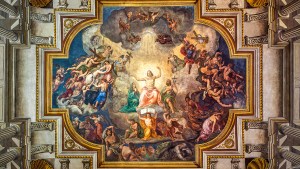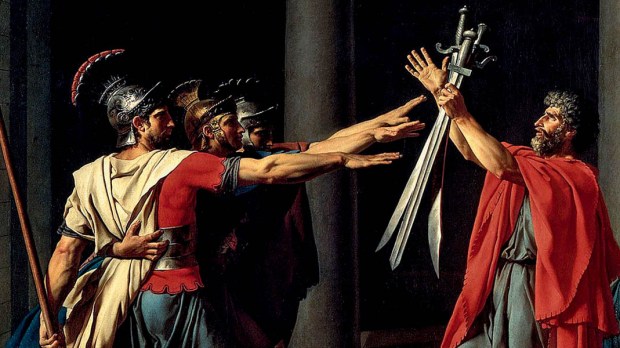Sunday we celebrate a sacramentum, a sacred sacramentum on the last day of the church year. This is when Christians liturgically declare that Christ is King, Lord of the Universe, among other titles we might use time to time.
It is to a king, to a recognized sovereign authority that a sacramentum is sworn.
The word looks familiar, doesn’t it? Like “sacrament,” maybe? There is a reason for that. There were of course no “church” words for the Church to use in the early years. The words had to be adapted as things went along.
Theologians, Church Fathers, the faithful, all rummaged around in their languages – Latin in West, Greek in the East – to come up with words that described what was going on, words that best matched the developing rites of the Church. Sacramentum, when one understands it, fit well and became the favored term to use.
In Roman law a sacramentum had a couple uses. It was a bond, a promise, and especially an oath of allegiance. As a bond a sacramentum was a required deposit in civil suits. It was paid by both plaintiff and defendant. One wins the case, the bond was returned. One loses and the bond was forfeit. (That, I’m guessing, may have discouraged frivolous lawsuits.) That was a sacramentum at law. The confiscated deposits, by the way, went into a common fund to help pay for sacrifices in the pagan civic temples.
It was a sacramentum too when a soldier enlisted in the army. It was an oath of allegiance to the Republic and to the laws of the Republic (when Rome was a republic), and later an oath personally to the emperor, alone. The military sacramentum was sworn annually by Rome’s armies and became a soldier’s holiday for the entire military establishment.
So when it came time to describe what was happening in Baptism, in the Lord’s Supper, to find a summary word for it, sacramentum was that word.
Baptism is our avowal of faithfulness to God through Christ; our enlistment act of allegiance. “Do you believe?” “Yes, I believe.” And so we have sworn. It is our public declaration.
Holy Communion is the same thing. By receiving the declared body and blood of Christ we, again, publically identify ourselves as Christians.
And it is public. That must be stressed, in public. You may watch your best friends watch you as you declare Christ is king. To put a finer edge on this, your worst enemies are free to drop by and listen in as you make a sacramentum to Christ, watch you go forward to the altar to receive Christ, watch as you mark yourself out in public for the sacramentum you have sworn.

Read more:
When wrestling with Latin actually gets you somewhere
So we must remind ourselves, Christ’s sacramentum in this world is sworn to a disputed sovereignty. In this world, we have sworn our allegiance to a contested kingship.
A “king” implies force, power, strength; authority to enforce the assertion of sovereignty over people and place, as the title “king” suggests. There is a smell of dominion in this, domination, the exertion of will; there is something powerfully afoot with the word “king.”
That’s why it is not always the safest of words or the wisest of titles, especially for what looks like, at best, an upstart king about to get trampled under as the real king enforces his dominion and sovereignty within his realm, a king who has the power of life and of death.
I cannot help but think some little sense of incredulity was going through Pilate’s mind as he questioned Jesus.
“So Pilate said to him,” as he flicked the smallest bit of lint from his otherwise immaculate robe, “‘Then you are a king?’” How interesting.
Pilate encountered him a little later. This time Jesus was dressed in a jumped up cloak suggesting royalty, wearing a briar patch for a crown, blood glistening on his forehead and leaking from his scourged back.

Read more:
The difference one little word can make
Had someone at this point quietly taken Pilate aside and whispered into his ear, “Look. This really is Christ the King, savior of humanity,” the only shrewd reply would have been, “Funny. He doesn’t look much like a king.”
It is to this king above all, we have sworn our sacramentum. But that is a two-way street.
It was first his sacramentum God swore to us in Christ, wasn’t it? This is why, whatever Pilate may have thought of him, we may make ours to him.

Read more:
Desperately seeking domination: “Thy kingdom come”

